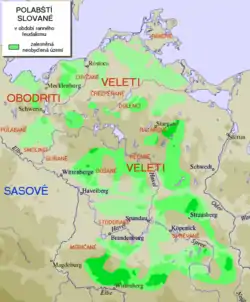Polabian language
Polabian is an extinct West Slavic language that was spoken by the Polabian Slavs (German: Wenden) in present-day northeastern Germany around the Elbe (Łaba/Laba/Labe in Slavic) river, from which its name derives (po Labe - up the Elbe or [living] up to Elbe). It was spoken approximately until the rise to power of Prussia in the mid-18th century, when it was superseded by Low German.
| Polabian | |
|---|---|
| Slüvensťă rec | |
| Pronunciation | /slyˈvɛˑn.stʲɐ rɛt͡s/ |
| Native to | Poland, Germany |
| Extinct | 18th century |
| Language codes | |
| ISO 639-3 | pox |
pox | |
| Glottolog | pola1255 |
| Linguasphere | 53-AAA-bc |
 Grey: Former settlement area of the Polabian Slavs. Green: Uninhabited forest areas. Darker shade just indicates higher elevation. The map already shows the Saxon (Sasové) invasion into the Veletic/Slavic territory of the Volci (Volcae), Chaci (Chatti) and Chruści (Cherusci). | |
By the 18th century, Lechitic Polabian was in some respects markedly different from other Slavic languages, most notably in having a strong German influence. It was close to Pomeranian and Kashubian, and is attested only in a handful of manuscripts, dictionaries and various writings from the 17th and 18th centuries.
History
About 2800 Polabian words are known; of prose writings, only a few prayers, one wedding song and a few folktales survive. Immediately before the language became extinct, several people started to collect phrases and compile wordlists, and were engaged with folklore of the Polabian Slavs, but only one of them appears to have been a native speaker of Polabian (himself leaving only 13 pages of linguistically relevant material from a 310-page manuscript).[1] The last native speaker of Polabian, a woman, died in 1756, and the last person who spoke limited Polabian died in 1825.
The most important monument of the language is the so-called Vocabularium Venedicum (1679–1719) by Christian Hennig.
The language left many traces to this day in toponymy; for example, Wustrow (way to the island or place on the island), Ljauchów (Lüchow), Łuków (Luckau), Sagard, Gartow, Krakow (resembling Kraków, Krakov…) etc. The Polabian language is also a likely origin of the name Berlin, from the Polabian stem berl-/birl- (swamp).
Grammar
Phonology
For Polabian the following segments are reconstructable:[2]
|
|
|
|
| Labial | Dental | Alveolar | Palatal | Post- palatal |
Velar | ||||
|---|---|---|---|---|---|---|---|---|---|
| Plosives | p | pʲ | t | tʲ | k | ||||
| b | bʲ | d | dʲ | ɡ | |||||
| Affricates | t͡s | t͡sʲ | |||||||
| d͡z | d͡zʲ | ||||||||
| Fricatives | f | s | ʃ | sʲ | xʲ | x | |||
| v | vʲ | z | zʲ | ||||||
| Nasals | m | mʲ | n | nʲ | |||||
| Laterals | l | lʲ | |||||||
| Trills | r | rʲ | |||||||
| Semi-vowel | j | ||||||||
Sample text
The Lord's Prayer in Polabian and related Lechitic languages, compared to Old Church Slavonic, Old High German and English:[3] Germanic loanwords, which are comparatively rare in the other West Slavic languages, are highlighted in bold (loanwords in Germanic versions are highlighted as well).
Dravénopolabski (Drawänopolabian):
|
Połabski: (Eastern Polabian):
|
Hornioserbšćina (Upper Sorbian):
|
Kashubian:
|
Polish:
|
Old Slavic (transliteration):
|
Old High German, 8th century:
|
German, 20th century:
|
English:[4]
|
See also
| Polabian language test of Wikipedia at Wikimedia Incubator |
| Polabian language repository of Wikisource, the free library |
| Wikimedia Commons has media related to Polabian language. |
- Wends
- Polabians (tribe)
- Veleti
- House of Griffins
- Slavic Native Faith
Notes
- Kapović (2008, p. 109)
- Cited after Kazimierz (1993, p. 799)
- Polabian version quoted after TITUS project
- Praying Together Archived 2013-10-29 at the Wayback Machine
References
- Olesch, Reinhold (1977), "Jezik polapskih Drevana: Stanje i zadaci istraživanja", Suvremena Lingvistika (in Serbo-Croatian), Zagreb, 15, archived from the original (PDF) on 2009-05-06
- Kapović, Mate (2008), Uvod u indoeuropsku lingvistiku (in Serbo-Croatian), Zagreb: Matica hrvatska, ISBN 978-953-150-847-6
- Rzetelska-Feleszko, Ewa (2002), "Polabisch" (PDF), Enzyklopädie des Europäischen Ostens (in German), Klagenfurt, archived from the original (PDF) on 2007-09-27
- Polański, Kazimierz (1993), "Polabian", in Bernard Comrie and Greville G. Corbett (ed.), The Slavonic languages, London & New York: Routledge, ISBN 978-0-415-28078-5
- Słownik etymologiczny języka Drzewian połabskich, Part 1: ed. Tadeusz Lehr-Spławiński & Kazimierz Polański, Wrocław, 1962, from Part 2 on: ed. K. Polański, Wrocław, 1971–
- Kazimierz Polański & Janusz Sehnert: Polabian-English Dictionary. The Hague: Mouton 1967